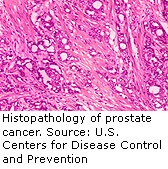
WEDNESDAY, July 28 (HealthDay News) — A newly approved therapeutic prostate cancer vaccine extended the lives of men with metastatic tumors resistant to standard hormonal treatment, a new study shows.
The vaccine, called Provenge (sipuleucel-T), improved survival by about four months compared with no treatment and involved less toxicity than chemotherapy. However, with a round of treatment potentially costing $93,000, the therapy could be out of the financial reach of many patients.
“The strategy of trying to harness the immune system to fight cancer has been something that people have tried to attain for many years; this is one such strategy,” said lead researcher Dr. Philip Kantoff, a professor of medicine at Harvard Medical School and a medical oncologist at the Dana-Farber Cancer Institute in Boston.
One expert said the therapy, while far from a cure, “looks promising.” Dr. Elizabeth Kavaler, an urologist at Lenox Hill Hospital in New York City, said that, “in this unfortunate category of [hormone-resistant] patient, we have very little to offer. Adding months to a man’s life is better than doing nothing, especially if the treatment involves minimal morbidity, as this vaccine promises.”
The new study, funded by the vaccine’s maker, Dendreon, is published in the July 29 issue of the New England Journal of Medicine.
Provenge is a therapeutic (not preventive) vaccine made from the patient’s own white blood cells. Once removed from the patient, the cells are treated with the drug and placed back into the patient. These treated cells then trigger an immune response that in turn kills cancer cells, leaving normal cells unharmed. Provenge is given intravenously in a three-dose schedule delivered in two-week intervals.
In April, the U.S. Food and Drug Administration approved Provenge for treatment of prostate cancer that has spread to other parts of the body and is resistant to standard hormone treatment.
For the study, Kantoff’s group randomly assigned 512 men to receive Provenge or placebo. All of patients had advanced prostate cancer that had proven resistant to standard hormonal therapy.
On average, men receiving Provenge lived 4.1 months longer than men receiving placebo, the researchers found. Average survival was 25.8 months for men in the Provenge group, compared with 21.7 months for men in the placebo group, meaning that Provenge extended survival by 22 to 25 percent, Kantoff said.
He contends that if the vaccine was used by men with less severe disease survival, it might be extended for even longer.
“Theoretically, if you take people with less diseases and you stimulate the immune system, you could have a more profound effect, but we don’t really know that yet,” he said.
Compared with other treatments, such as chemotherapy, radiation and hormone therapy, Provenge has been touted as having fewer and less severe side effects. In this trial, the most common side effects were chills, fever and headache, the researchers noted.
Kantoff said the vaccine is just the first step in immune system therapies for cancer. “This study opens the door for a whole new form of therapy, which is immunotherapy,” Kantoff said.
Another vaccine for prostate cancer, called GVAX, had been tested in a phase 3 trial, Kantoff noted, “but that didn’t work.”
“There are many other things that could work and they are in development right now. The hope is there will be many things that will work. This study is really a proof of principle that the concept works and hopefully there will be many other things that will add to, or improve upon this,” he said.
Prostate cancer expert Dr. Anthony D’Amico, chief of radiation oncology at Brigham and Women’s Hospital in Boston, said that “the concept of immunotherapy for prostate cancer was unexpected, but important and perhaps the beginning of a new approach to the treatment of this disease.”
He added, “The only thing that doesn’t make it a home run is you are not curing anybody, but you are prolonging their life and their quality of life with a treatment that has very little toxicity.”
However, the availability and cost of Provenge are issues that need to be resolved, D’Amico said. “It’s very expensive and there is going to be a huge demand for it.”
A four-week treatment with Provenge would cost as much as $93,000, according to an editorial accompanying the study.
Moreover, new guidelines are expected to recommend the use of Provenge before using the new chemotherapy drug Taxotere (docetaxel), D’Amico said. “Taxotere, although less expensive, has a lot more toxicity and has about the same benefits [as Provenge],” he said.
Commenting on the high cost of Provenge, Kantoff countered that “this is a treatment given over a four-week period, as opposed to other treatments that are given over many months, where the costs can be high as well, if not comparable to or more expensive [than Provenge].”
More information
For more information on prostate cancer, visit the American Cancer Society.

